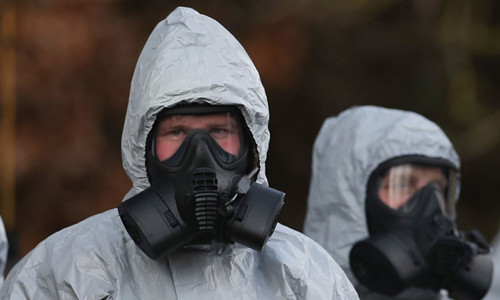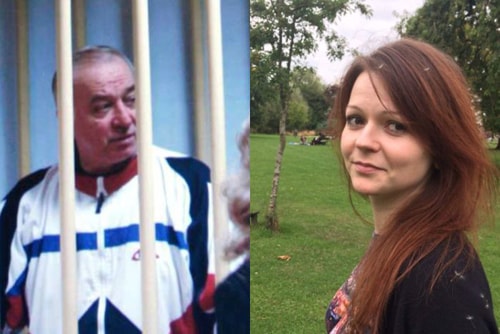The world's most powerful nerve agent used in the assassination of a former Russian spy
Novichok, which means "rookie" in Russian, is a powder that can cause victims to have convulsions and stop breathing within minutes.
Speaking before the House of Commons yesterday, British Prime Minister Theresa May said that former Russian intelligence colonel Sergei Skripal and his daughter Yulia were murdered by Novichok, the most dangerous nerve agent ever created by humans, and stressed the "high possibility" that Moscow was involved in this incident, according toSun.
Researchers at the Defence Science and Technology Laboratory in Porton Down, England, collected samples at the scene and determined that the poison that critically injured the Skripals was Novichok, a compound researched and developed by the Soviet Union in the 1980s.
Skripal and his daughter were found unconscious on a bench outside a shopping center in Salisbury, England, on March 4. "Her eyes were white and wide open, foaming at the mouth. The man was stiff, his hands stopped moving but he was still staring straight ahead," a witness described the condition of Skripal and his daughter when they were first discovered. Experts confirmed that these are typical signs of victims of nerve agent poisoning, according toAtlantic.
Because it was developed much later than other nerve agents such as VX or sarin, it was given the name Novichok, which means “newcomer” in Russian. Novichok is usually used in a fine powder form, with a slightly different chemical composition than VX and sarin, but is believed to be 5-10 times more lethal than these commonly used agents, and can resist conventional anti-poisoning treatments.
Sarin was the nerve gas used in the 1995 Tokyo subway terrorist attack that killed 12 people, while VX was the nerve agent rubbed on the face of suspected assassin Kim Jong-nam at the airport in Malaysia's capital Kuala Lumpur, killing him quickly. However, Novichok has never been used in an attack before.
Like other nerve agents, Novichok usually infects victims through the respiratory tract or through absorption through the skin. After entering the victim's body, Novichok causes the heart to slow down and the airways to constrict, causing the victim to die from suffocation.
An American doctor explained toABC Sciencethat all nerve agents such as Novichok, VX or sarin have the same mechanism of action, which is to neutralize acetylcholinesterase, the enzyme that catalyzes the hydrolysis of the neurotransmitter acetylcholine into choline and acetic acid. This is a necessary reaction for cholinergic neurons to return to a resting state after activation.
"You can imagine that if you disable an important 'off switch' in the body, causing all the neurons to 'turn on' at the same time and not be able to rest, the body will be in trouble," the doctor said.
Hiện tượng này khiến cơ thể nạn nhân nhanh chóng quá tải vởi các biểu hiện như đổ mồ hôi, nôn mửa, tăng cường bài tiết, sùi bọt mép, co giật. Vì tim và cơ hoành bị rối loạn hoạt động, nạn nhân sẽ bị co rút, tê liệt và ngạt thở.
Tất cả những yếu tố này khiến người nhiễm độc Novichok chết vì suy tim hoặc ngạt thở khi phổi bị ngập trong một lượng lớn dịch tiết. Khi sử dụng với liều cao, chất độc Novichok có thể khiến nạn nhân tử vong trong vài phút. Nếu nạn nhân không thiệt mạng, Novichok vẫn có thể gây ra những tổn thương vĩnh viễn cho não bộ của họ.
Dễ dàng qua mặt an ninh
|
Chuyên viên phòng hóa Anh thu thập dấu vết chất độc tại hiện trường. Ảnh: AFP. |
Novichok còn nguy hiểm ở chỗ nó được coi là "vũ khí hóa học nhị phân", nghĩa là nó được kết hợp từ hai thành phần vốn vô hại, nhưng trở thành chất độc chết người khi trộn lẫn vào nhau. Đặc tính này khiến Novichok rất dễ vận chuyển, xử lý và có thời gian bảo quản dài hơn so với các chất độc thần kinh khác.
Andrea Sella, giáo sư ngành hóa vô cơ tại Đại học London, cho rằng việc được tạo thành từ hai hóa chất nông nghiệp hợp pháp khiến Novichok có thể dễ dàng được che giấu và sử dụng mà không gây hại cho kẻ thực hiện vụ tấn công.
"It was designed to bypass any standard chemical security checks," Colonel Hamish de Bretton-Gordon toldExpress. "Skripal chỉ cần chạm vào loại bột này khi mở một gói hàng là nó đã có thể ngấm vào mạch máu của ông ta".
Although the ingredients are very simple and cheap, the method of preparing Novichok is extremely complicated and requires special safety measures, causing Soviet scientists to spend nearly a decade creating this poison.
“These chemicals are so dangerous that no amateur terrorist group could have made them,” said Professor Sella. “They could only have been made in a government-sponsored lab.” By analyzing traces of the chemicals left at the scene, scientists can determine which lab made them.
Secret chemical weapons program
|
Skripal (left) and his daughter are in critical condition after the attack. Photo:ABC. |
Novichok was first mentioned in a 1992 article by Will Englund about a nerve agent developed in the Soviet Union. A year later, scientist Vil Mirzayanov of the Russian Institute of Organic Chemistry and Technology visited the newspaper's bureau.Baltimore Sunin Moscow to release information about this top secret chemical weapon.
According to information provided by Mirzayanov and colleagues, Novichok was developed by the Research Institute of Organic Chemistry and Technology in 1987 and tested in Shikhani, southeastern Russia, as well as in the Nukus region of Uzbekistan.
Englund interviewed a scientist named Andrei Zheleznyakov, who described his experience of being exposed to Novichok for one minute in a laboratory in 1988, saying he saw "bright colors and hallucinations." Zheleznyakov died shortly after the interview.
The Russian government under Boris Yeltsin at the time denied that it had produced the nerve agent Novichok and refused to include the compound on the list of chemical weapons banned under international conventions.
Mirzayanov was arrested in late 1993 and charged with revealing state secrets. However, Russian courts later found insufficient evidence to convict the scientist and he was released. He moved to the United States to live and work at Rutgers University.
A 2014 report by the Nuclear Threat Initiative accused Russia of possessing thousands of tons of weapons-grade Novichok. After the Skripal assassination attempt, US Secretary of State Rex Tillerson also said the poison "clearly came from Russia" and warned that the country would "take retaliatory measures." The Kremlin has so far denied any involvement in the plot to kill the former intelligence colonel, who was convicted of treason.



